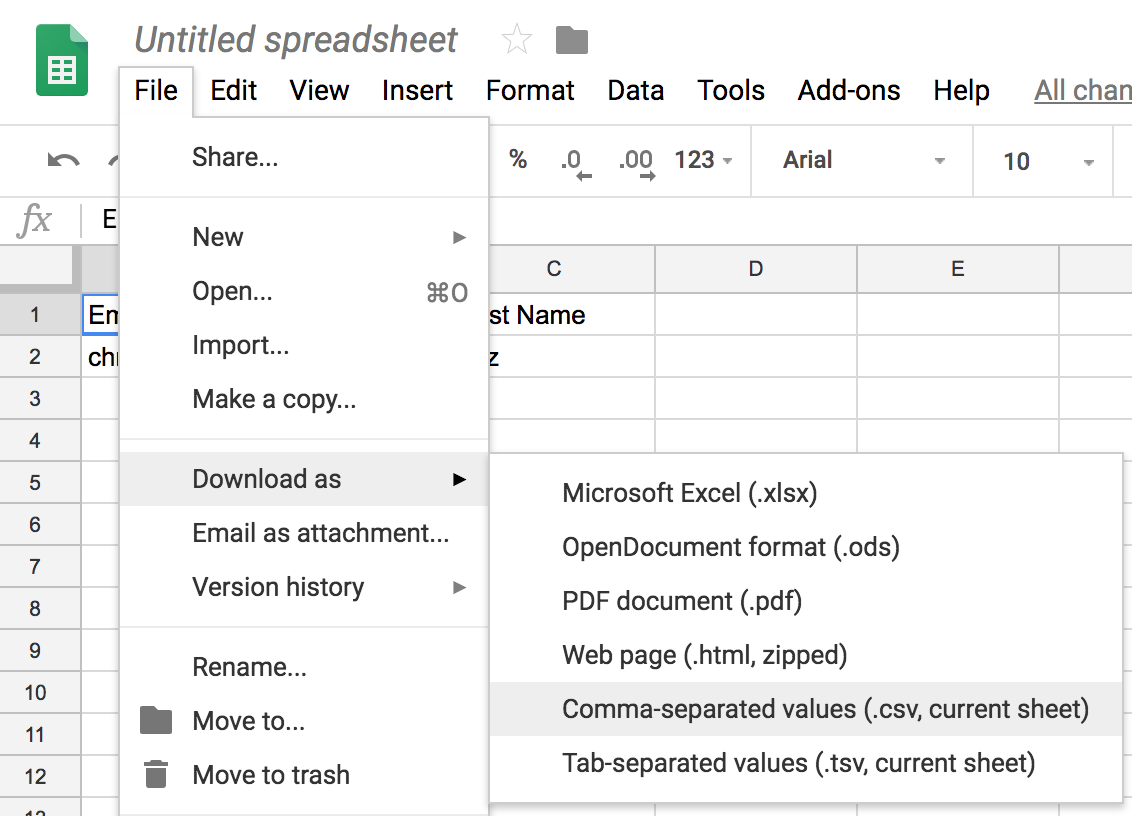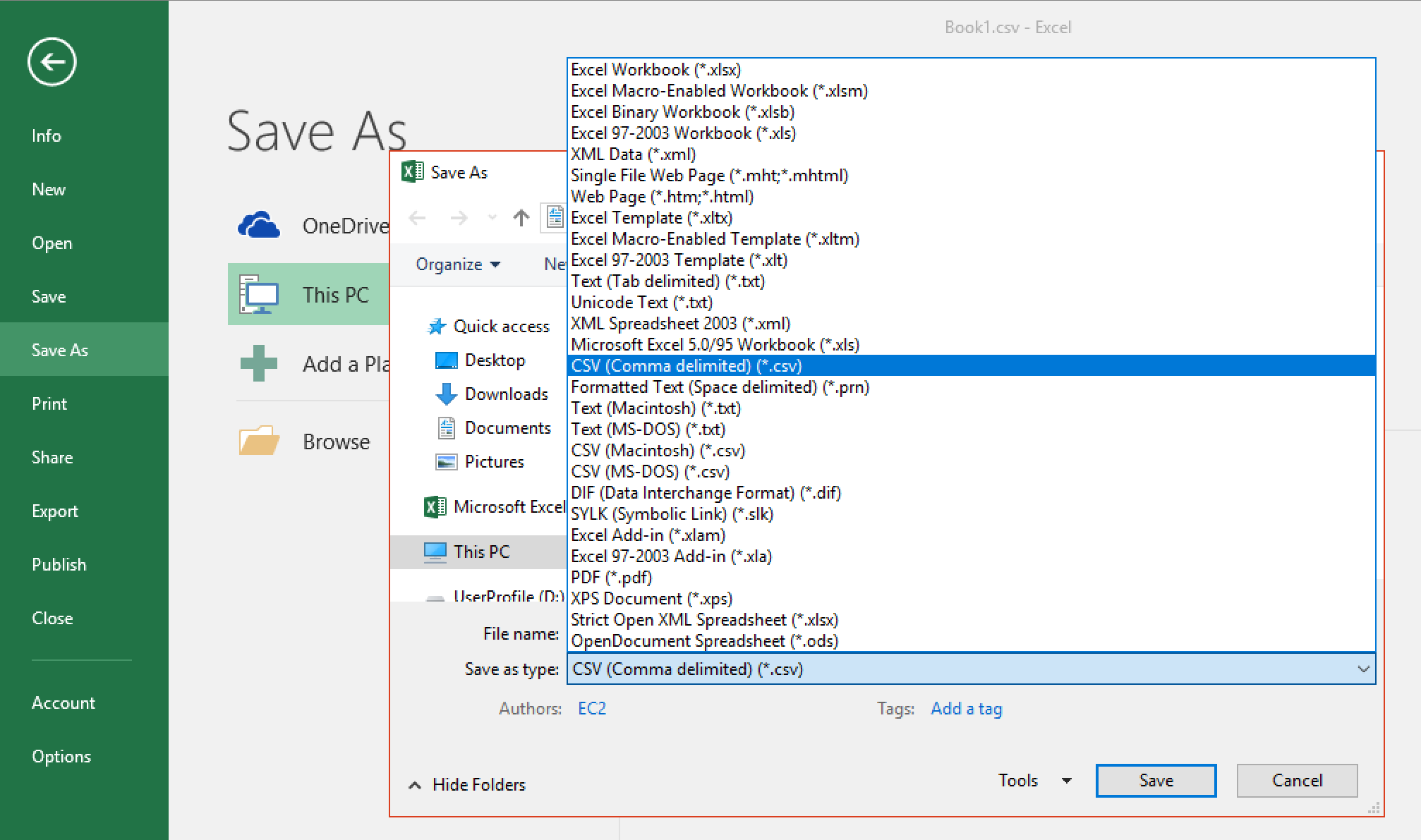Importing Contacts
Supported files formats and mapping columns to fields
Supported CSV Formats
BigMailer supports importing contacts from CSV files. Most spreadsheet software and other tools that work with tabular data can save into CSV format, so getting your contacts into BigMailer shouldn't be an issue. BigMailer supports the most commonly used CSV formats.
Google's Sheets and Apple's Numbers support saving to CSV format. The CSV formats generated by these products are supported by BigMailer.

Downloading a CSV from Google Sheets
Microsoft Excel Workbook supports saving to CSV format as well. Sheets saved as "CSV (Comma delimited) (.csv)", "CSV (Macintosh) (.csv)", or "CSV (MS-DOS) (*.csv)" are supported by BigMailer.

Saving an Excel sheet to CSV
If you have contacts in a database and are exporting them using a custom program or script, use , as the delimiter, " as the quote, and \r\n as the line terminator. These characters are typically the defaults used by CSV libraries so you might not need to change anything.
Text Encoding
BigMailer expects CSV files to contain text encoded as UTF-8. Google's Sheets and Apple's Numbers use UTF-8 by default. If you're using either of those, you shouldn't need to change any options when saving to a CSV file.
If you're using Microsoft Excel, you'll likely need to change the encoding when saving to a CSV file because UTF-8 is not the default. Watch this brief video to learn how to change the encoding.
Mapping Columns to Fields
After you upload a CSV, BigMailer scans the contents and tries to automatically match up the columns in the file with the fields you have in the current Brand. As you might imagine this is not a foolproof process, so BigMailer may need some help matching the columns in the CSV to fields.
One way you can help BigMailer before uploading the CSV is by ensuring the first row contains the names of the fields you want the columns to match up to. For example, suppose your CSV contains two columns, one with email addresses and one with names. By adding a row with "Email" and "Name" at the beginning of the CSV, you can indicate to BigMailer that it should map the columns to fields with those names.
Barring matching column names, BigMailer looks at the values in each column and tries to match them up to fields based on data types. For example, it can match a column of emails to your email field, or a column of IP addresses to the "IP Address" field.
After the automatic column to field matching, BigMailer gives you a chance to review and change things. You may need to explicitly match columns to the different fields, or create new fields to match columns to.
Data Types
CSV files are just text and rows can contain any values. If you are matching columns of a CSV to fields other than text fields, some care must be taken to ensure values are valid for the data type of the fields. For example, if you are matching an integer field to a column in a CSV, the column must contain integer values such as 4 or -10, not values such as cat or hamburger.
Date
Data in date columns must be text in one of these formats: yyyy-mm-dd or mm/dd/yyyy. If there are any characters after the date they will be ignored. This means it is OK if values contains time after the date; the time will just be ignored.
Email
Data in email address columns must be valid email addresses such as [email protected].
Integer
Data in integer columns must be numbers such as 4, 0, or -10. Values such as cat, hamburger, or 10.5 are not allowed.
IP Address
Data in IP address columns must be IPv4 addresses in dotted decimal notation, for example 48.0.1.2.
Text
Data in text columns can have any value.
Boolean
You can't create boolean fields of your own, but BigMailer defines builtin fields of this type such as "Is Subscribed" and "List: My Awesome Contacts". BigMailer recognizes these values as true: 1, true, t, yes, and y. Similarly, it recognizes these values as false: 0, false, f, no, n, and (an empty string).
Updated 5 months ago
